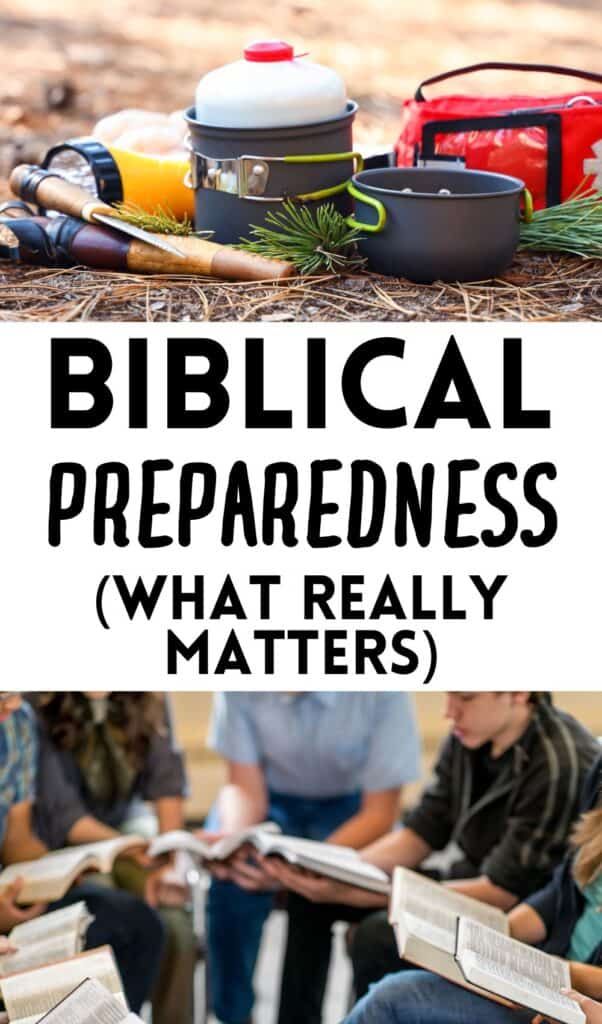Is Prepping Biblical?
While I consider preparedness a critical consideration for any homestead (or rural dweller), I don’t consider myself a prepper by most definitions.
A few years ago, however, I might have leaned towards the prepper mindset. In, let’s say – 2020 – I might have said that prepping is Biblical, no doubt.
But four years on the other side of the fear, I have come to some new conclusions about preparedness and what it means (or should mean) for the Christian.
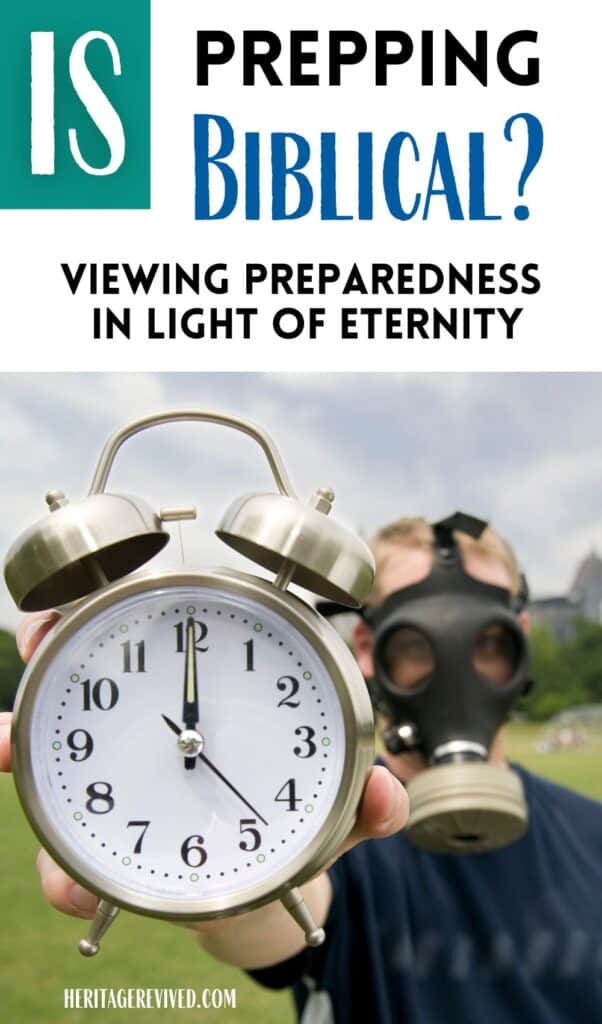
After a lot of prayerful study and reflection over time, I have realized the benefit of a balanced perspective on Biblical preparedness. I know it’s led to a transformation in my heart and mind.
So if you’re like I was, seeking to make choices about preparedness that are wise but not based on fear- this post is for you.
This site contains affiliate links to products. As an Amazon associate, I earn from qualifying purchases. Please read my disclosure for more info.
Biblical Wisdom (and defining terms)
Being a prepper and understanding Biblical preparedness are really two different things I’m going to contrast and compare, so I’ll explain what I mean by these definitions first.
The “prepare for anything” prepper
A prepper in my mind is someone who is nearly certain that something ominous is in the future, and it is every person’s duty to defend against it (to the best of their ability). You might call this a doomsday prepper, more specifically. And that is probably the type of prepping I’m essentially warning against in this post.
This type of preparation usually considers every possible scenario for a large-scale disaster. They spend much time researching various ways to combat everything from a nuclear attack to the collapse of our government and every smaller disaster that could occur in between.
They may live off-grid, and attempt to produce all food and supplies from homegrown sources and ingenuity.
Doomsday preppers aren’t crazy (for the most part). They simply look at current and historical events as evidence for reasons to prepare, often in extreme ways. They may have good reasons to assume the need to fend for themselves, in an increasingly hostile world.
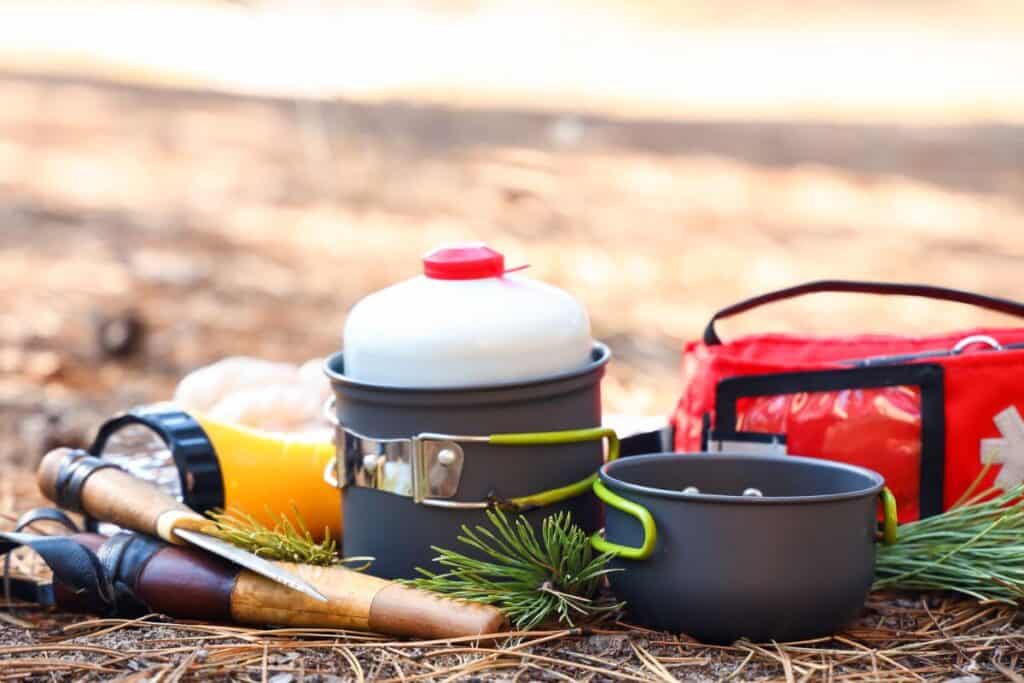
In this mindset, it’s not just good to know about old-fashioned skills for the sake of learning and appreciating them (or living more simply); it’s critical to their future survival, and possibly the survival of mankind. It can easily become an all-consuming lifestyle.
The main problem with preparing for everything is – you can’t. And you’ll soon become exhausted trying to identify and combat every possible threat from every possible angle.
I’ve been down the rabbit trails. I understand there are very basic skills we should all know (first aid, how to purify water, foraging, etc.). But in reality- we can’t control all the variables that can arise from an unknown future.
Biblical and historical preparedness
In contrast to preparing for every possible future scenario, we have general wisdom literature to guide us in Scripture.
The book of Proverbs, for instance, paints a stark contrast between the prudent, faithful and wise person and the unprepared, foolish person who lacks wisdom and whose actions lead to self-induced poverty.
Clearly, using our resources, time and talents to provide for ourselves and our family is a Biblical value. In addition, generosity towards others in our sphere of influence is not only encouraged, but defines the Christ follower.
Yet, nowhere in the Bible are we, in general, mandated to store food to last years into the future (more on this shortly). In fact, we see the consistent theme that God wants His people to trust Him- whether in times of abundance or times of need.
In general, people throughout history understood that there is a season for everything. Food storage in times past simply meant storing up what you were able to, to last until the next harvest.
Dependence on God meant trusting that “As long as the earth endures, seedtime and harvest, cold and heat, summer and winter, day and night will never cease.” (Genesis 8:22).
Is it possible our modern ability to store far beyond the between-harvest period simply has given us a false sense of security? That our information age has deceived us into thinking we’re nearly invincible, if we only have enough of the right skills and knowledge?
The Fear Factor
During the pandemic when supply chain shortages became evident, I found myself succumbing to the fear that I needed to prepare for the worst. I focused the most on food storage, because buying and growing food was…something I could do.
It feels good to do something when the world is careening off a cliff (or so it seemed).
Having a way to preserve food for a longer period helped me, in a sense, to alleviate the most tangible fear at the time.
There were several good things that resulted. I became a more serious gardener. I learned more about food storage and preservation and wasted far less food than before.
I emphasized a waste-not, want-not philosophy with my kids that finally seems to be sticking. I learned a new appreciation for cooking, reusing and making more things from scratch.
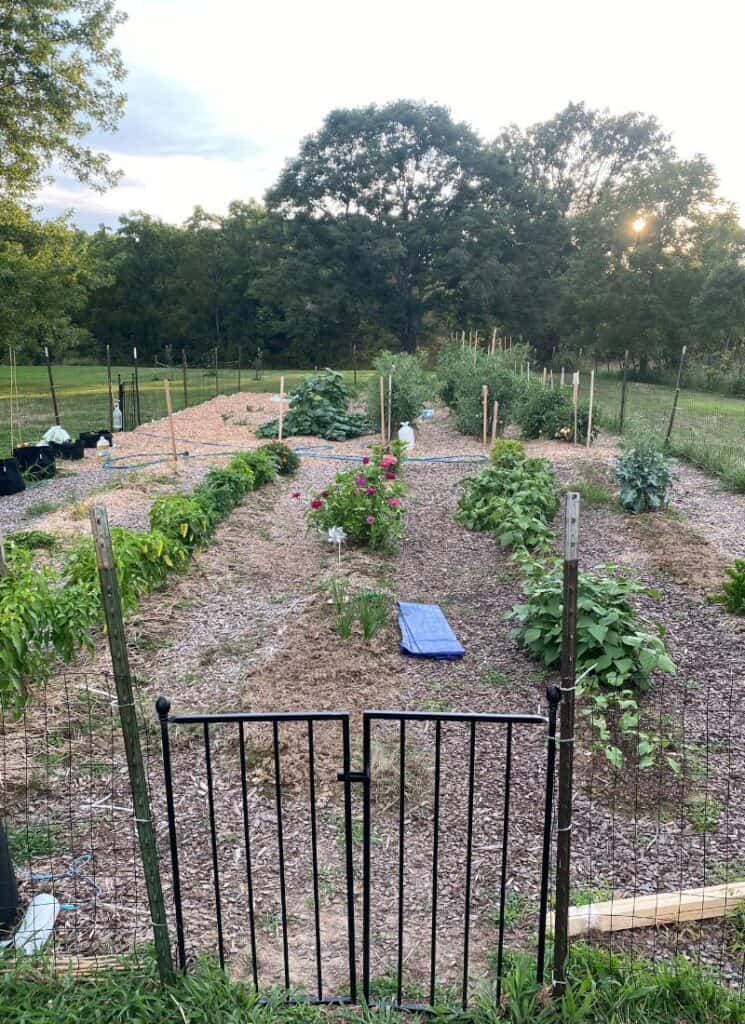
But you know what? Even with supply chain disruptions, there was never a time I couldn’t get the most basic food staples. I might have had to shop around (a lot), and scour the internet for yeast. (Sourdough, anyone?)
But we were, and are still not, ever lacking in our basic necessities.
Fear might have motivated me to hone my homesteading skills, but the reality is I had no need to fear in the first place. The King of the universe owns the cattle on a thousand hills, and He has, and will make sure I have what I need, for as long as He plans for me to be here.
Scripture is ripe with the mandate to not be afraid. We are not to fear man, or any disaster. But we are to fear God.
I’ve had to face the questions: How often am I more afraid of running out of food, than of disobedience to God? How often do I put my trust in my preparedness skills, instead of God Himself?
Over and over again, I needed to be reminded of where my provision originates.
Prescriptive versus Descriptive Narrative
In every homesteading/preparation group I’ve been in through the years on social media, I’ll see the same defense of large-scale prepping, over and over.
“Joseph stored grain and saved his family and the world at the time!”
“Noah prepared for a flood before there was rain! He saved humanity!”
And yes, they did – with God’s specific instruction, direction and provision.
However, making a personal application of every Bible account is simply bad theology.
Some accounts in the Bible are descriptive (what happened/ what people did), and some are prescriptive (what God wants His people to do in general.) We must discern the difference.
What I haven’t seen referenced much is the example of the widow of Zarephath. You know, the woman who was baking her last loaf of bread for herself and her son “that we may eat it and die”?
Elijah comes along and says, hey- make a small loaf for me first, will you? And, she did.
More often than not, God will ask us to give of ourselves instead of store up for ourselves. (And yes, God did provide for the widow and her son in a miraculous way. She trusted that He would, too.)
We can absolutely learn from the faithfulness of every person mentioned as such in the Bible. But we need to see what God is actually teaching us through those accounts – not simply try to replicate their actions because it’s “in the Bible”.
In Our Extended Pantry We Trust (with lock and key)
I do believe having an extended pantry is wise, for those who are able. But my main reason today for any “extra” has more to do with convenience; not in the belief that my pantry will save me.
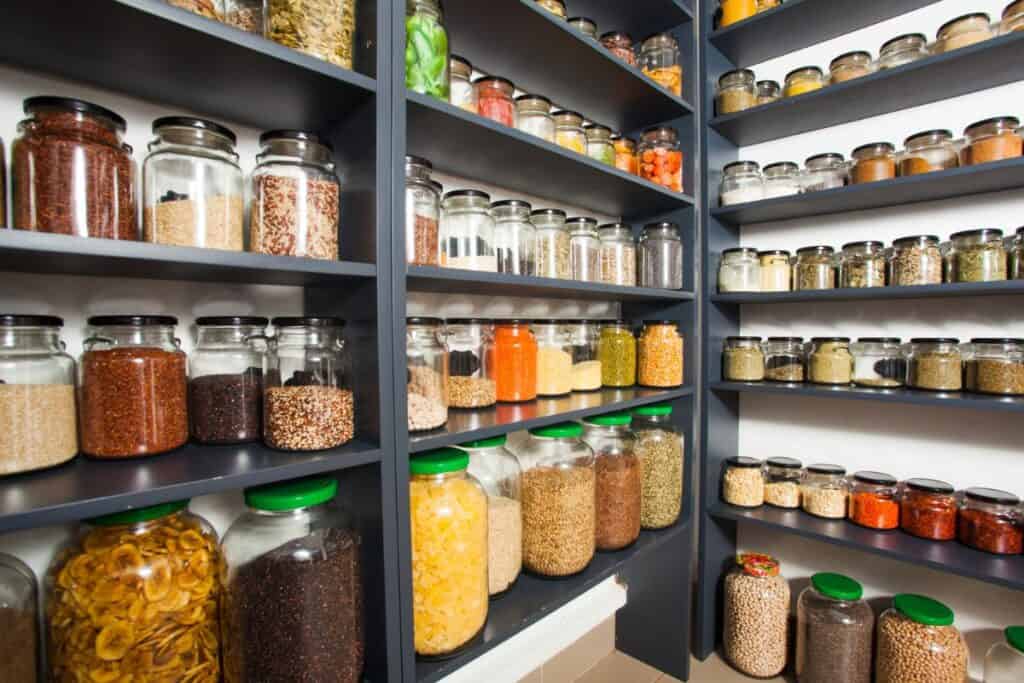
Since I cook nearly everything from scratch, having a decent supply of whole food staples is important to me.
I don’t want to have to rely on processed foods or whatever is available in my area, if worse comes to worse. (Although, those would probably fly off the shelves first. Ha!)
But you know what? Those are, again, my preferences. I could make do with what is available, and be thankful for it.
My great-grandparents certainly learned the value of appreciating the limited variety of foods that were available to them, and I could, too.
So I’m not storing food for far into the future. Just enough to keep me out of the grocery store as much as possible, and to provide for my family in the short-term. (In the event of more realistic events: natural disasters, inflation, job loss, etc.)
Let’s not forget: food can be taken. Even with diligent food storage methods, things can go rancid, rotten and stale.
“Do not store up for yourselves treasures on earth, where moths and vermin destroy, and where thieves break in and steal. But store up for yourselves treasures in heaven, where moths and vermin do not destroy, and where thieves do not break in and steal. For where your treasure is, there your heart will be also.” (Matthew 6:19-21)
Generosity versus “never enough”
I’ve also witnessed in Facebook groups, the vast numbers of Christians vowing they will never share their vast food storage with family members who refuse to “prep” for themselves. If this is the mentality I need to be a real prepper, then count me out.
Gently: the moment we see our abundance as a source of superiority is the moment we are no longer humble servants of our God, who calls us to be generous.
And the truth is, we will never feel like we have “enough” to want to share with others.
Lisa Harper shared this humbling quote in a recent podcast series on Biblical generosity:
“We have to recognize His benevolence before our crooked hearts can ever be generous enough to give freely.”
Ouch, my trampled toes.
Confidence versus certainty
It’s easy to fall into the trap of having confidence in our own ability to provide for ourselves.
Even this is evidence of our pre-existing prosperity. In the book The Ruthless Elimination of Hurry by John Mark Comer, he cites the statistic that 90% of the world’s wealth is held by 10% of the world’s population.
It takes prosperity to be in the place to know what you’re eating tomorrow, much less one, or five, or ten years from now.
So what do the other 90% of the world’s Christians do in uncertain times? They trust God- with perhaps no pantry at all.
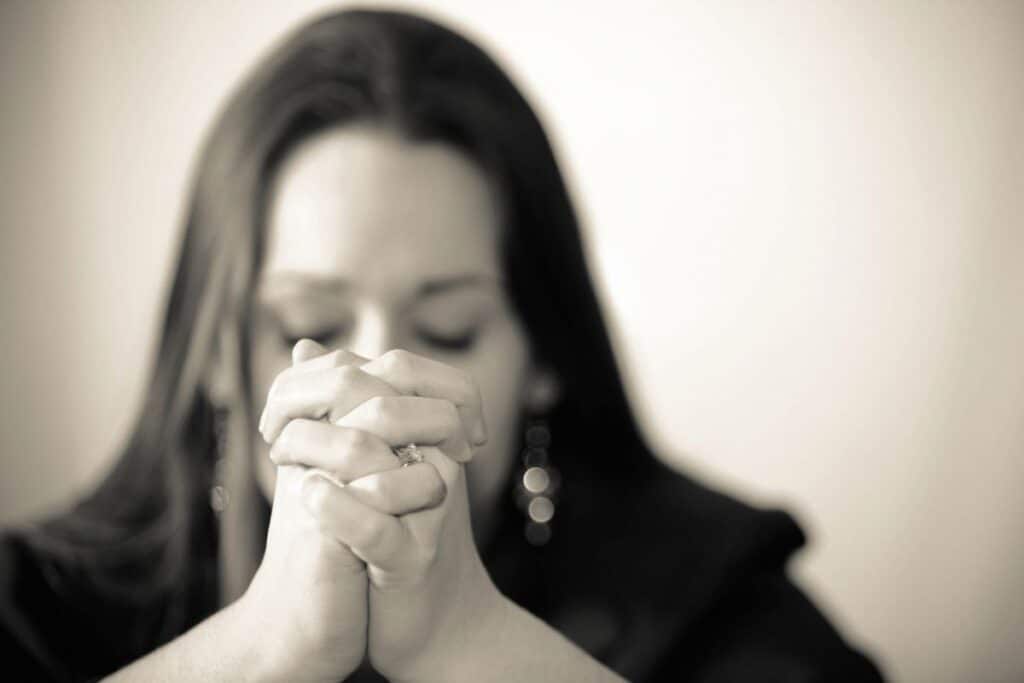
As Americans, most of our trust in God has been replaced in self-confidence and knowledge (or what we think we know).
We might feel certain that something big and scary is about to happen -with a little help from the latest doomsday social media personality, perhaps. If we feel like we can pinpoint our biggest threats, we can prepare for them, right?
But like Saul consulting the witch of Endor, we need to be careful we’re not looking to “future tellers” for a sense of false comfort.
The fact is, civilization has always been ripe with uncertainty. But we get to choose how we deal with uncertainty and fear of the future.
We can look to Psalm 27 (among other Psalms) and see how David- who spent many years fleeing for his life – faced his fears. He took them to the Lord.
“The Lord is my light and my salvation— whom shall I fear?
The Lord is the stronghold of my life— of whom shall I be afraid?
When the wicked advance against me to devour me, it is my enemies and my foes
who will stumble and fall.
Though an army besiege me, my heart will not fear;
though war break out against me, even then I will be confident.” (verses 1-3)
The great theologian C.S. Lewis had this to say about his approach to the threats of his day:
“This is the first point to be made: and the first action to be taken is to pull ourselves together. If we are all going to be destroyed by an atomic bomb, let that bomb when it comes find us doing sensible and human things—praying, working, teaching, reading, listening to music, bathing the children, playing tennis, chatting to our friends over a pint and a game of darts—not huddled together like frightened sheep and thinking about bombs. They may break our bodies (a microbe can do that) but they need not dominate our minds.”
Prepping for Eternity
So, is prepping Biblical? Clearly, it depends on our definition of prepping, and how much of our lives are consumed by it.
Here’s where my own thoughts seem to settle lately:
If we spend all our time preparing for an uncertain future on Earth, we will be that much shorter on time preparing for a certain eternity.
It’s kind of like the old adage that “death and taxes” are the only certain thing in life. As Christians, we know that eternity is the only certain thing about the next life.
God’s desire for his people is that our hearts will be prepared for Him. That our current lives will be prepared for our future life. That we will pour out ourselves – our time, energy, and yes, financial resources- making sure that others know Him and are prepared to meet Him, too.
In Psalm 27:13, David concludes:
“I remain confident of this: I will see the goodness of the Lord in the land of the living.”
Amen. Let us continue to be wise, diligent, and hardworking. To save, spend, and give generously, as God compels our hearts. And then go on living in the goodness of the Lord, knowing we can’t know it all, or do it all, or prepare for it all.
Because that was always the point.
You might also like:
What is simple living? (Getting started.)
Our favorite Azure Standard products
How to become more self sufficient
